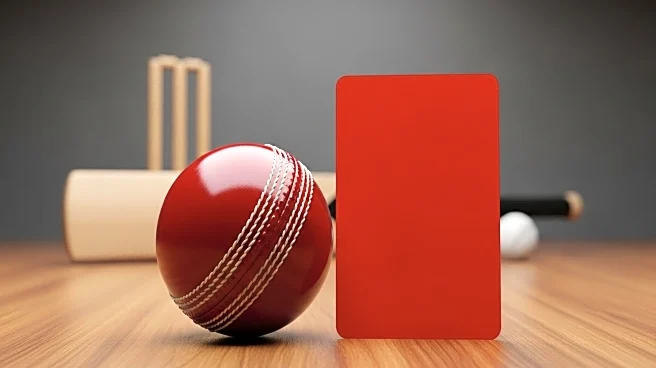What's Happening?
The International Cricket Council (ICC) has decided to fine Pakistan's fast bowler Haris Rauf following a disciplinary hearing related to the recent India-Pakistan Asia Cup match. Rauf admitted to misconduct after aggressively throwing the ball at India's Sanju Samson and making a hand signal interpreted as politically charged. The ICC committee, consisting of match referee Richie Richardson, senior event operations manager Sally Higgins, and tournament director Andrew Russell, supported by Pakistan team manager Naveed Cheema, determined that Rauf's actions warranted a Level II offence, resulting in a penalty of 50% of his match fee. Meanwhile, Pakistan's opener Sahibzada Farhan escaped sanction after explaining his gunshot-style celebration as a traditional gesture from his home region, which the panel accepted as non-political. Indian captain Suryakumar Yadav also faced the committee for political remarks made after the match, likely resulting in a 15% fine of his match fee.
Why It's Important?
The ICC's disciplinary actions highlight the ongoing tensions between India and Pakistan, which have spilled over into the realm of sports. The political undertones of the match and subsequent gestures underscore the strained relations between the two nations, exacerbated by recent military hostilities. The fines and hearings serve as a reminder of the delicate balance sports organizations must maintain in politically charged environments. The incident may impact future interactions between the teams and influence how sportsmanship is perceived in international cricket, potentially affecting the diplomatic relations between India and Pakistan.
What's Next?
The ICC's decision may lead to increased scrutiny of player conduct in future matches, particularly those involving India and Pakistan. Both the Pakistan Cricket Board (PCB) and the Board of Control for Cricket in India (BCCI) have lodged complaints with the ICC, which could result in further investigations or policy changes to address politically motivated gestures and statements. The incident may also prompt discussions within cricketing bodies about the role of sports in diplomacy and the importance of maintaining neutrality in international competitions.
Beyond the Headlines
The disciplinary actions taken by the ICC reflect broader issues of how sports can be influenced by geopolitical tensions. The incident raises questions about the responsibilities of athletes as representatives of their countries and the potential for sports to either bridge or widen divides. The ICC's handling of the situation may set precedents for how similar cases are managed in the future, emphasizing the need for clear guidelines on political expressions in sports.









